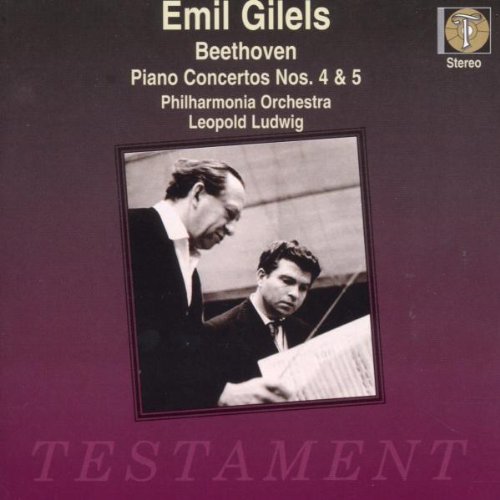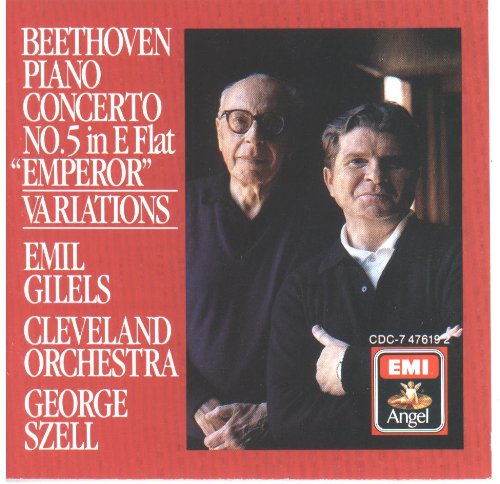Gilels plays Beethoven
View record and artist detailsRecord and Artist Details
Composer or Director: Ludwig van Beethoven
Label: Testament
Magazine Review Date: 4/1997
Media Format: CD or Download
Media Runtime: 73
Mastering:
ADD
Catalogue Number: SBT1095

Tracks:
| Composition | Artist Credit |
|---|---|
| Concerto for Piano and Orchestra No. 4 |
Ludwig van Beethoven, Composer
Emil Gilels, Piano Leopold Ludwig, Conductor Ludwig van Beethoven, Composer Philharmonia Orchestra |
| Concerto for Piano and Orchestra No. 5, 'Emperor' |
Ludwig van Beethoven, Composer
Emil Gilels, Piano Leopold Ludwig, Conductor Ludwig van Beethoven, Composer Philharmonia Orchestra |
Composer or Director: Ludwig van Beethoven, Antonín Dvořák
Label: Double Forte
Magazine Review Date: 4/1997
Media Format: CD or Download
Media Runtime: 118
Mastering:
ADD
Catalogue Number: 569509-2

Tracks:
| Composition | Artist Credit |
|---|---|
| Concerto for Piano and Orchestra No. 5, 'Emperor' |
Ludwig van Beethoven, Composer
Cleveland Orchestra Emil Gilels, Piano George Szell, Conductor Ludwig van Beethoven, Composer |
| (32) Variations on an Original Theme |
Ludwig van Beethoven, Composer
Emil Gilels, Piano Ludwig van Beethoven, Composer |
| (12) Variations on a Russian Dance from Wranitzky' |
Ludwig van Beethoven, Composer
Emil Gilels, Piano Ludwig van Beethoven, Composer |
| (6) Variations on an Original Theme, "Die Ruinen v |
Ludwig van Beethoven, Composer
Emil Gilels, Piano Ludwig van Beethoven, Composer |
| Symphony No. 8 |
Antonín Dvořák, Composer
Antonín Dvořák, Composer Cleveland Orchestra George Szell, Conductor |
| (16) Slavonic Dances, Movement: No. 3 in A flat |
Antonín Dvořák, Composer
Antonín Dvořák, Composer Cleveland Orchestra George Szell, Conductor |
| (16) Slavonic Dances, Movement: No. 2 in E minor |
Antonín Dvořák, Composer
Antonín Dvořák, Composer Cleveland Orchestra George Szell, Conductor |
Composer or Director: Ludwig van Beethoven
Label: Double Forte
Magazine Review Date: 4/1997
Media Format: CD or Download
Media Runtime: 136
Mastering:
ADD
Catalogue Number: 569506-2

Tracks:
| Composition | Artist Credit |
|---|---|
| Concerto for Piano and Orchestra No. 1 |
Ludwig van Beethoven, Composer
Cleveland Orchestra Emil Gilels, Piano George Szell, Conductor Ludwig van Beethoven, Composer |
| Concerto for Piano and Orchestra No. 2 |
Ludwig van Beethoven, Composer
Cleveland Orchestra Emil Gilels, Piano George Szell, Conductor Ludwig van Beethoven, Composer |
| Concerto for Piano and Orchestra No. 3 |
Ludwig van Beethoven, Composer
Cleveland Orchestra Emil Gilels, Piano George Szell, Conductor Ludwig van Beethoven, Composer |
| Concerto for Piano and Orchestra No. 4 |
Ludwig van Beethoven, Composer
Cleveland Orchestra Emil Gilels, Piano George Szell, Conductor Ludwig van Beethoven, Composer |
Author: Richard Osborne
True, this Cleveland cycle contains a well-nigh peerless account of the C minor Concerto that EMI later put out separately as a single mid-price LP (HMV Concert Classics, 3/84 – nla). For the rest, the set is one I always find myself returning to with high expectations – “this time, surely, it will sound right” – only to come away disappointed.
The blame for the cycle’s failure lies fairly and squarely with Szell; and with recordings that were evidently balanced and blended at his behest. This is Szell at his most schoolmasterly (in the old-fashioned sense of the word), didactic and unyielding. Occasionally, Gilels gets his bid in first and things go swimmingly, with the finely schooled Cleveland players responding to him like chamber musicians. But it is usually only in the finales that this happens. In the first movements, Szell has the whip-hand and however imaginatively Gilels plays in solo interludes old Grumpo is usually there waiting at the end of the corridor with yet another constricting tutti. In the First Concerto this contrast assumes unintentionally comic proportions when, after being route-marched through the opening movement, Gilels cuts loose and plays the shortest and most skittish of Beethoven’s three available cadenzas.
Less funny is the rigorous and often unmusical way in which Szell and the engineers distort balances by an over-literal reading of dynamic markings: random accompanying string interjections (printed piano) standing out with a kind of three-dimensional clarity that draws the attention away from the piano’s imaginative musings (printed pianissimo).
That said, the second of the EMI two-CD sets, the one that couples the Emperor Concerto and Dvorak’s Eighth Symphony is possibly worth exploring. Again, it is a very severe account of the Beethoven; and, again, Szell is in didactic mood in parts of the Dvorak, the tempo consciously reined back at times in a way that conductors like Talich, Stupka or Bruno Walter would never have countenanced. And yet for all that, this is a performance of great intelligence and insight, peerlessly played and superbly recorded. As for the two fill-ups, here Szell is absolutely the master; there is no one I would rather hear conduct these dances than him. Though why settle for just two dances? Szell’s complete set of the Dvorak Slavonic Dances (Sony Classical, 11/92) is a gramophone classic.
After the Szell cycle, it is both a relief and a joy to turn to Testament’s reissue of Gilels’s 1957 EMI recordings of Beethoven’s Fourth and Fifth Concertos with Leopold Ludwig and the Philharmonia Orchestra. This is one of the – perhaps the most – perfect accounts of the Fourth Concerto ever recorded, light years away from the Szell recording in sensibility and imaginative grace. Here poetry and virtuosity are held in perfect poise, with Ludwig and the Philharmonia providing a near-ideal accompaniment.
The recording is also very fine, though be sure to gauge the levels correctly by first sampling one of the tuttis. If the volume is set too high at the start, you will miss the stealing magic of Gilels’s and the orchestra’s initial entries and you will be further discomfited by tape hiss that, with the disc played at a properly judged level, is more or less inaudible.
The recording of the Emperor Concerto is also pretty good, making one wonder what aberrations of LP technology led Roger Fiske and Trevor Harvey to get so angry about the mono and stereo originals when they first appeared in 1957-8. As to the performance, this is not quite on a par with that of the Fourth Concerto. Ludwig and the orchestra tend to follow Gilels rather than integrate with him in the way that Menges and the Philharmonia do on Solomon’s classic 1955 recording (EMI, 11/95). There are times, too, especially in the slow movement, when Gilels’s playing borders on the self-indulgent. (Do I hear Szell’s shade stirring and muttering, “Now you see my point”?) This is not, however, sufficient reason for overlooking this fine and important Testament reissue.'
Explore the world’s largest classical music catalogue on Apple Music Classical.
Included with an Apple Music subscription. Download now.

Gramophone Digital Club
- Digital Edition
- Digital Archive
- Reviews Database
- Events & Offers
From £9.20 / month
Subscribe
Gramophone Club
- Print Edition
- Digital Edition
- Digital Archive
- Reviews Database
- Events & Offers
From £11.45 / month
Subscribe
If you are a library, university or other organisation that would be interested in an institutional subscription to Gramophone please click here for further information.






